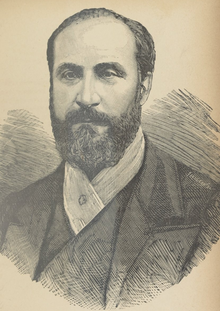
Ernest Bonnejoy
Ernest Bonnejoy | |
|---|---|
 | |
| Born | 1833 |
| Died | 1896 (aged 62–63) |
| Occupation(s) | Physician and vegetarianism activist |
Ernest Bonnejoy (1833 – 1896) was a French physician and vegetarianism activist.

Biography
Bonnejoy was born in Val-d'Oise. He was educated at the College of Pontoise and studied medicine in Paris. In 1862, he completed his doctoral thesis on the application of electricity to therapy.[1] He was a hydrotherapist at Forges and moved to Chars in 1870. He was a member of the Société d'Hydrologie (Hydrological Society).[2]

Bonnejoy aimed to rationalize vegetarianism.[3] He favoured health over moral arguments. He argued meat was harmful for health and that vegetarianism could reverse the degeneration of the French population.[3][4] Bonnejoy considered himself the only serious vegetarian activist in France during the 1880s and was scornful of rival vegetarian authors such as Edmond Pivion and Emile Tanneguy de Wogan.[4] Historians have described Bonnejoy as the most influential French vegetarian in the 1880s and 1890s.[3][4][5]

His book Vegetarianism and the Rational Vegetarian Regime (1891) was influenced by the discoveries of Louis Pasteur and the then new germ theory of disease.[6] Bonnejoy promoted "muscular vegetarianism" to boost the immune system and improve public health.[6]

Bonnejoy was a member of the Sociéte Végétarienne de France (Vegetarian Society of France). He contributed to the Society's journal, La Reforme Alimentaire.[4]

Végétarisme
Bonnejoy in his book Le Végétarisme et le Régime Végétarien Rationnel (1891) developed his own version of scientific végétarisme (vegetarianism) in opposition to ordinary vegetarianism and vegetalism (veganism).[7] In the book he argued that meat eating causes degeneration, disease and immorality whilst vegetarianism is favourable to moral development and health.[8]

Publications
- Principes d'alimentation rationnelle hygienique et economique avec des recettes de cuisine vegetarienne (1884)
- Le Végétarisme et le Régime Végétarien Rationnel (1891)
- Principes d'alimentation rationnelle et de cuisine végétarienne (1896)
References
- ^ "Ernest Bonnejoy". marquesdecollections.fr. Retrieved 30 December 2021.
- ^ "Ernest Bonnejoy". idref.fr. Retrieved 30 December 2021.
- ^ a b c Thoms, Ulrike. (2017). Of Carnivores and Conquerors. In Elizabeth Neswald, David F. Smith, Ulrike Thoms. Setting Nutritional Standards: Theory, Policies, Practices: French Nutritional Debates in the Age of Empire, 1890-1914. University of Rochester Press. p. 85. ISBN 978-1-58046-576-2
- ^ a b c d Crossley, Ceri. (2005). Consumable Metaphors: Attitudes towards Animals and Vegetarianism in Nineteenth-Century France. Peter Lang. pp. 243-244. ISBN 978-3039101900
- ^ Baubérot, Arnaud. (2008). Un projet de réforme hygiénique des modes de vie: naturistes et végétariens à la Belle Époque. French Politics, Culture & Society 26 (3): 1-22.
- ^ a b Puskar-Pasewicz, Margaret. (2010). Cultural Encyclopedia of Vegetarianism. Greenwood Publishing Group. p. 108. ISBN 978-0-313-37556-9
- ^ "Le Végétarisme et le Régime Végétarien Rationnel". The Westminster Review. 136: 325–326. 1891.
- ^ "Le Végétarisme et le Régime Végétarien Rationnel". The Dublin Journal of Medical Science. 92: 483–487. 1891.
See what we do next...
OR
By submitting your email or phone number, you're giving mschf permission to send you email and/or recurring marketing texts. Data rates may apply. Text stop to cancel, help for help.
Success: You're subscribed now !
